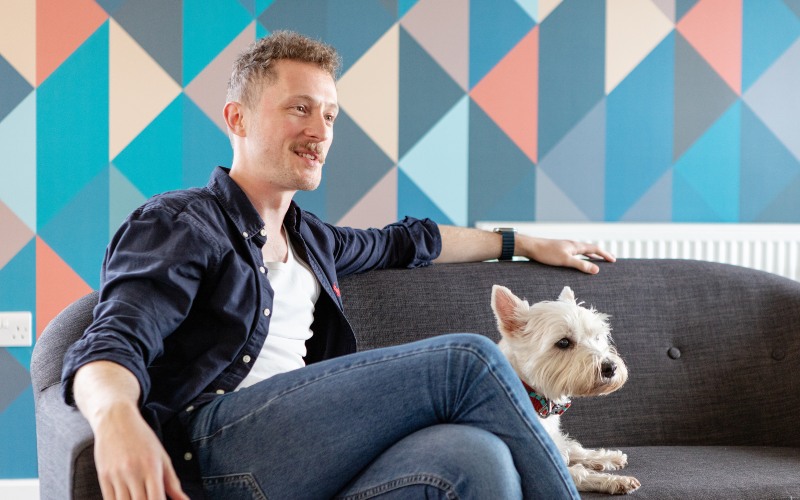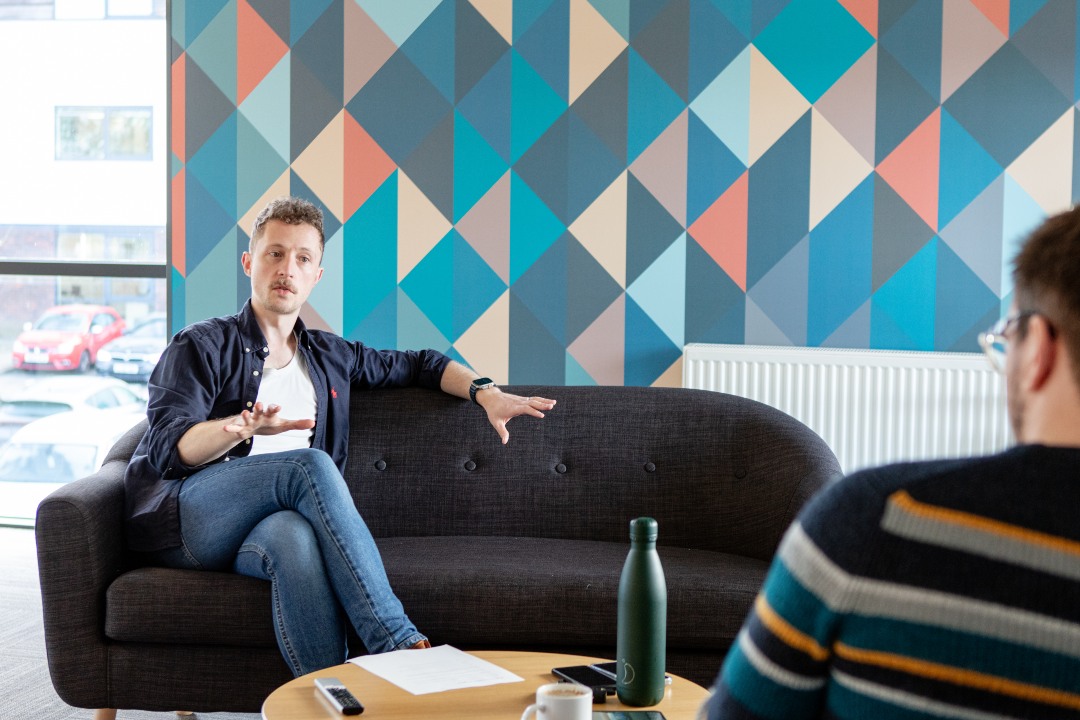As part of our 2023 insights initiative at Romero Insurance Brokers, we will be highlighting team leaders across the Romero Group. Over 12 months, The Romero Group will showcase 12 important figures, each from different departments and different disciplines.
Eleventh in our Insights Series is Oliver Calvert. Ollie heads up our Brand and Marketing team, charged with managing the website, running our social channels, creating physical and digital collateral, and growing the Romero brand. Ollie has to communicate with both the leadership team and outward-facing members of staff, to produce a uniform message for clients. Ollie discusses with us the benefits of a Brand and Marketing team in a sector which doesn’t usually invest in this area, and how it’s important for managers to provide their staff with autonomy.
 Oliver Calvert (left) and his dog, Harry (right)
Oliver Calvert (left) and his dog, Harry (right)
What are your roles and responsibilities?
I’m Head of Brand. It’s my job to help the business look and feel as engaging as it possibly can be. Compared to the other departments, we’re probably the most exposed to the broadest number of people across the business.
It’s my responsibility to engage with all departments, ensuring that every section of the business delivers the same vision and communication style. We ensure clients receive a consistent experience. Whether it be first interaction, making a claim, or renewal, I try to ensure that everything is very identifiably ‘Romero’. This is the core of what my team does.
It’s true that an insurance company of our size would not normally have an in-house multi-person Brand and Marketing department. That’s because a lot of traditional brokers will instead have a collective of insurance professionals who do their own marketing, or as the business has grown, someone has picked up a responsibility of doing the marketing. Rather than having a branding professional who markets the insurance.
Why is a Brand department essential for an insurance company?
When I first started and looked to improve, or essentially re-create, the Romero brand, I held a meeting with the directors of the business. I did a little exercise, where I pulled out a key description from our previous website and placed it alongside those of four or five of our main competitors. None of the directors could identify Romero’s.
Differentiation is the main focus of the Brand team. It’s a matter of pulling out the components that show Romero as better than and different to the competition. If customers are looking at different brokers for the same level of cover, I ask why they would choose Romero?
It’s about remembering what the customer wants to hear, not what we want to tell them. The brand department helps our staff better engage with customers and brings uniformity to all forms of communication.
Please can you briefly recount your career pathway and management experiences?
My career path was not the most linear. I studied advertising and marketing at university. Whilst at university, I opened two restaurants, creating those brands from the ground up. Couple of years later I entered a ticketing company as the Chief Marketing and Operations Lead. That was a startup and is now one of the biggest ticketing platforms in the world. I moved into another ticketing related business, which is where I met Simon [Mabb], Romero Insurance Brokers’ Managing Director. I then went to work for a full-service marketing agency – that’s where I developed a deep practical understanding of brand strategy. Having received a breadth of experience there for four to five years, working with national brands, I was approached by Simon. Simon asked me if I knew anybody who’d consider taking over the marketing strategy and here I am.
I’ve been at Romero Insurance Brokers for five years now. I look after the entire group and have built a team encompassing the skills the business requires and also wants to develop as part of our growth.

Where do you sit on the conversation of an in-house brand team vs using a marketing agency?
Because our product is quite technical, it can be difficult to outsource it. Understanding insurance, it can take a year for a new starter not previously involved in insurance to get to grips with the details. So, trying to brief externally for someone not familiar with the sector would be really challenging, so it was always my focus that Romero Insurance would have an in-house team.
An in-house team ties into the spirit of Romero – It gives us flexibility and speed to react to what’s going on in the market. Say a big piece of legislation came out, COVID being the perfect example, if we were with an agency this would require a full briefing process, ensuring they understood what we were telling them, and then fitting within an agency schedule to write copy, edit websites, create assets. The cost is another thing; as soon as we need something urgently, we are beholden to them and they can increase the price of an invoice. Agency becomes exponentially more expensive for the business.
Day to day, with agency, you have less control over how your information and data is managed. Whereas, by in-housing, we can have a conversation over job flows and react instantly.
Do you agree that marketing goes under-the-radar in insurance businesses?
Yes essentially. A lot of ‘the old guard’ viewed and still view marketing, particularly social media marketing, as not a core part of the business – That opinion very quickly changes when we do something that demonstrates the value that we add. It could be a major loss, and then the Client Execs get access to a piece of research that helps them support their client. It could be more detailed information around a cover an Exec is not as clued-up on about. No-one can understand every bit about every policy at all times, but we can provide the resources so that it’s there to support them when needed.
We are as useful as the people make us, so it’s part of my responsibility to make colleagues understand the importance of how we can support them.
We are in a really fortunate position that we work really closely with the leadership team, who also understand our importance, but we must make sure we don’t sit in a bubble, and that we interact with other areas of the business.
What are the work processes that you’ve put in place within your department?
One simple process is that we are on the induction list for new starters, giving us an opportunity to tell them who we are and what we do. This is crucial for some experienced starters who have maybe come from an insurance broker without a Brand and Marketing department.
As far as engaging the rest of the business, there’s no written process. People will interact with us differently. Because there is such a broad spectrum of personalities.
One of the key things about our discipline, is that we require open mindedness, creativity, flexibility, and to be able to reflect back what people want from you onto them. It’s a very empathetic discipline within business because you can’t be rigid or fixed about how you communicate.
It’s all about creating visibility within our team. From day one, when people join my team, I always try to drive them to meet and experience all areas of the business. It’s not me, as a figurehead, creating a process and communicating outwards, it’s about us being visible so that colleagues can get to know our own specialisms and expertise.
If you’ll pardon the metaphor – I see us like roots. We will expand and go out across the entire business to speak to people and deliver insights and build relationships whilst also gathering valuable information we can use in the work we do.
How does the presence of a Brand and Marketing team at an insurance broker benefit the clients?
We aid in the development of trust between client and broker. Clients and people internally will learn that the information they are receiving from us is accurate and correct and relevant – because we understand them. It’s that understanding which is the true value of an in-house creative team. As well as the creativity to build a message, the flexibility to adapt to an individual; it’s the understanding that we truly know what we are talking about.
Another benefit is that the Brand and Marketing team often act as a bridge – or more regular touch point – on behalf of the business. Our department acts as challengers to the status quo – we are less restricted to the formats of typical client-broker relationships, such as processing a claim, processing a renewal. Outside the process, we are able to break up the usual rhetoric, help the insurance broker be different, and achieve a more receptive relationship with clients.

As a manager, what is the single most important skill you need to have to perform your role successfully?
Autonomy. Providing and giving autonomy to the people that you manage. There are boundaries to a degree, but with the kind of work that we do, being flexible, being creative, I think management should not involve specific directions. My focus is around giving a broad guide of the role, and then allowing people to form that role around themselves.
Everyone works differently; everyone thinks differently; everyone is unique. If I dictate how to work then it will mirror how I work, which might be great for one person but stifle another. Giving people the autonomy to drive their own career and role within the business is key.
People have to perform within the business, but also management is about growing people, learning how they want to evolve, what they want to do, and ensuring people feel empowered. If people feel empowered, they’ll feel motivated, and then they’ll deliver the best for you.
If you tell someone to do X, Y and Z, they’ll do that and do only the bare minimum. However, if you give people the scope and flexibility to achieve, they’ll go above and beyond expectations.
It’s about driving people towards a goal rather than telling them how to get there – and that applies to most forms of management within a business. I understand there are certain circumstances in certain jobs where a process must be followed, but there needs to be flexibility, even in more structured roles, to let people do things their own way.
I’ve been lucky to have worked under some really good managers that share this philosophy. A dictatorial management style doesn’t work with my workstyle, whereas a hands-off management style does. Autonomy alongside necessary support is the ideal – to nudge someone in a direction, helping them find the solution for themselves, which for their own development is way more beneficial.
Autonomy particularly applies when managing upwards. If you are the leader of a department and have been brought in as a subject matter expert, you can’t be a Yes-man. You need the confidence to counteract decisions, challenge upwards, and come up with solutions.
Is there a universal piece of advice you would give to other managers?
Being adaptable. Focus on the individual as well as the shared goal. As a manager you have a shared goal that your team needs to achieve, but within that you have an individual who you need to support and nurture and help them develop their own career as well as grow what they bring to the business.
Thank you to Oliver for his detailed account of the role of the Brand and Marketing team and of being a manager in a unique position. Ollie is greatly appreciated by the leadership team and also client-facing members of staff, providing key resources and helping the business as a whole move with the times.
To read more of the insights series, see here.


